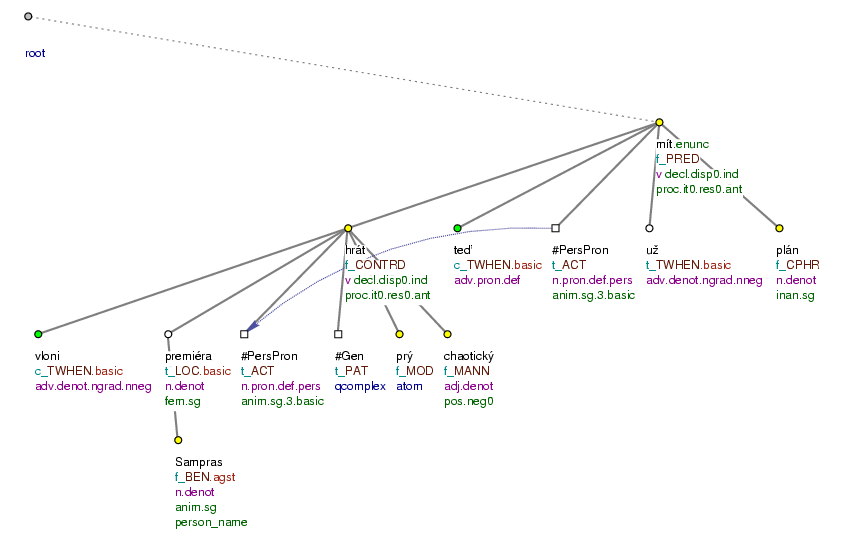- Definition of the functor
CONTRD -
The functor
CONTRD(contradiction) is a functor for free modifications expressing a confrontational background for the event (or state) expressed by the governing verb.
The confrontation is usually carried out in such a manner, that in the background of one fact (expressed by a clause), a different or contradicting fact (also expressed by a clause) comes into the foreground as with an embossed relief. Therefore, a free modification with the functor CONTRD is usually represented by a verbal clause. Typically, the syntactic structure of the governing clause and the dependent clause is parellel.
Forms. A modification with the functor CONTRD is formally expressed by a dependent clause introduced by a subordinating conjunction zatímco:
-
dependent clause.
The most common forms:
zatímco Zatímco dříve se dotovaly byty, které ovšem zdaleka nedostávali ti nejpotřebnější, napříště by měly peníze směřovat přímo k lidem, tedy k nájemníkům. (=While the apartments were subsidized in the past for those who did not really need them, the money should be directed to the tenants directly in the future.) Examples:
Zatímco loni prý v premiéře proti Samprasovi hrál.
CONTRDchaoticky, nyní už měl plán. (=While he was told to play chaotically last year in his premiere against Sampras, now he had a plan.) Fig. 7.51Tvorbu zisku omezuje vysoká daň z přidané hodnoty na výstupech, zatímco značná část vstupů je zatížena.
CONTRDminimální sazbou odpočitatelné daně. (=The revenue creation is limited by the high VAT on the output, while the major part of the input is charged by the minimal rate od the deductive tax.)Z repertoáru ministra financí má zaznít zhudebněná báseň Bez peněz do hospody nelez, zatímco předseda republikánů nacvičuje.
CONTRDevergreen Pryč s tyrany a zrádci všemi. (=We should hear a musical version of the poem "Do not go to the pub with no money" from the repertoir of the finance minister, while the head of republicans is training the evergreen "Away with tyrants and all traitors".)Zatímco v roce 1989 obnášel.
CONTRDvýrobní sortiment Desty deset výrobků, může dnes děčínská akciová společnost nabídnout téměř pět desítek nových výrobků. (=While the portfolio of Desta company contained ten products in the year 1989, the company from Decin can offer almost fifty new products today.)
Figure 7.51. The CONTRD functor

Zatímco loni prý v premiéře proti Samprasovi hrál chaoticky, nyní už měl plán. (=lit. While last_year they_say in premiere against Sampras (he) played chaotically, now already (he) had plan.)
Border with the functor TPAR. Apart from introducing dependent clauses with the CONTRD meaning, the subordinating conjunction zatímco (=while) can also introduce dependent clauses with the meaning of the temporal functor TPAR (see Section 3.7, "TPAR"). The choice between these two functors can sometimes be problematic, as two parallel events (TPAR) can, at the same time, sharply contradict each other (CONTRD). The meaning of confrontation is present in those cases when the dependent clause, introduced by the conjunction zatímco, does not refer to an event simultaneous with that denoted by the governing clause. In those cases where the two events are simultaneous (whether contradictory or not), the effective root node of the dependent clause is assigned the functor TPAR. Compare:
-
Zatímco Sparta v druhé třetině vedla.
CONTRD, nakonec odcházela se svěšenou hlavou. (=While Sparta led the match in the second third, finally they were leaving with their heads bowed.) -
Zatímco já jsem celý den tvrdě pracovala.
TPAR, ty jsi jen lenošila. (=While I have been working the whole day, you only lazed about.)
For more on dependent clauses introduced by the conjunction zatímco (while) see also Section 5.4.2.2, "Constructions with the connective "zatímco"".
Border with the functor CONFR. The functor CONTRD is semantically very close to a functor of coordination, namely CONFR (see Section 12.1.2, "CONFR"). However, the confrontation meaning with the CONTRD functor is expressed hypotactically, while the CONFR functor is reserved for the cases of confrontation expressed paratactically. Compare:
-
Zatímco loni prý v premiéře proti Samprasovi hrál.
CONTRDchaoticky, nyní už měl plán. (=While he was told to play chaotically last year in his premiere against Sampras, now he had a plan.) -
Loni prý v premiéře proti Samprasovi hrál chaoticky, kdežto.
CONFRnyní už měl plán. (=He was told to play chaotically last year in his premiere against Sampras, whilst now he had a plan.)
For more on the equivalence between functors for coordination and functors for dependent modifications see also Section 6.2, "Coordination and apposition".
Borders with other functors (especially with the COND functor). A similar meaning of confrontation (or background for something else), expressed hypotactically, can be found in dependent clauses introduced by the subordinating conjunctions jestliže (=if), aby (=so that), když (=when). However, the meaning of confrontation or background in these clauses is rather covered by the meaning of the subordinationg conjunction (i.e. condition, purpose or a temporal meaning). Therefore we prefer to use the functors for these meanings. Compare:
-
Jestliže dnes za surové dříví z jednoho hektaru smrkového lesa může utržit.
CONDasi 350 tisíc korun, zhruba 140 tisíc korun z toho musí vynaložit na založení dalšího porostu. (=If he can sell the raw wood from one acre of pine forrest for 350 thousand crowns, he has to spend approximately 140 thousands crowns on planting the new vegetation.)
See Section 5.4.2, "False dependent conjunctional clauses" for details.